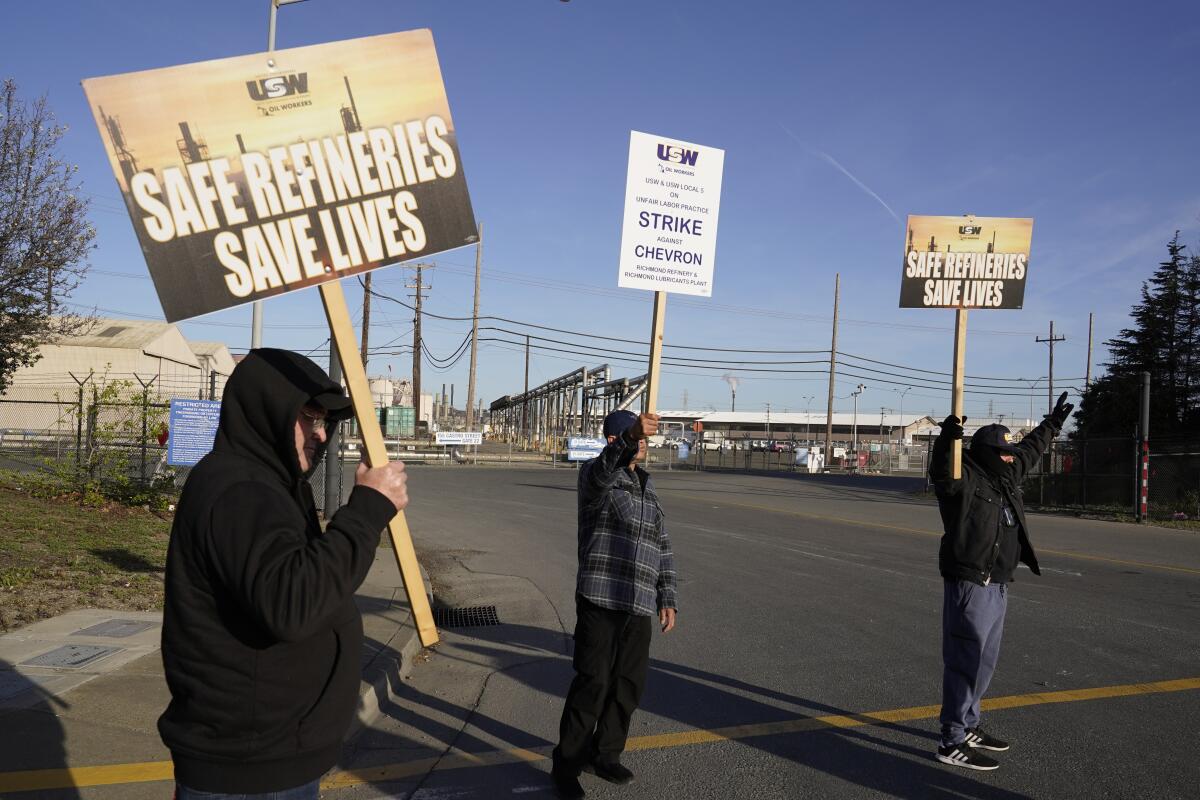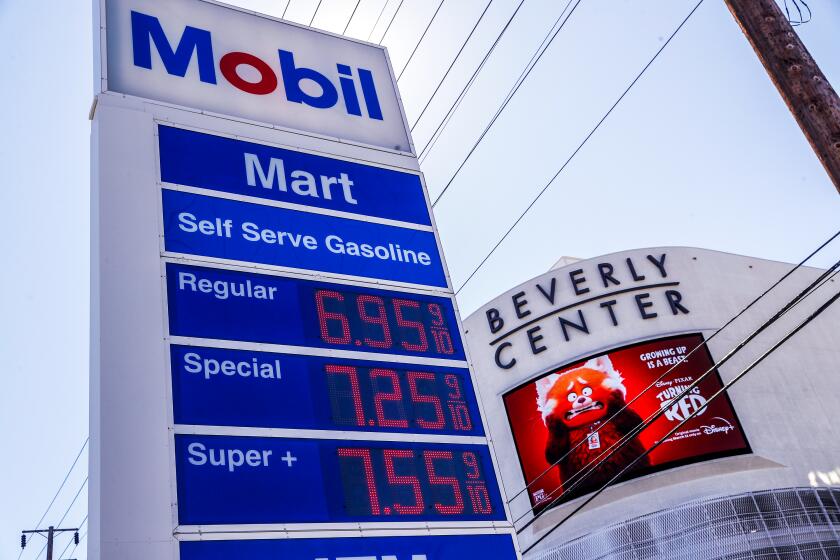Workers strike at Chevron’s Northern California refinery. What will it mean for gas prices?

Picketers outside Chevron’s refinery in Richmond, Calif.
- Share via
RICHMOND, Calif. — More than 500 workers at a Chevron refinery in the San Francisco Bay Area went on strike early Monday over safety concerns and to demand a salary increase to keep up with inflation and the area’s high cost of living.
The strike affecting the refinery in Richmond began at 12:01 a.m. It came after workers voted down Chevron’s most recent contract offer and the company refused to return to the bargaining table, the United Steelworkers union said.
Chevron Corp. said refinery operations will continue despite the strike, and it does not expect any supply-chain issues.
If the strike were to shut down the refinery, that could further boost fuel prices in California — which has the highest regular gasoline price average in the nation at $5.855 a gallon, according to the American Automobile Assn. Gas prices have been soaring since Russia invaded Ukraine, and Chevron’s Richmond refinery is one of the state’s largest.
Chevron said in a statement it is “fully prepared to continue normal operations.”
“We anticipate no issues in maintaining a reliable supply of products to the market,” it said.
High gas prices are making life difficult for many drivers. But some people aren’t bothered, mainly because they switched to other modes of transportation.
Ken Medlock, director of the Center for Energy Studies at Rice University’s Baker Institute, said it is highly unlikely the strike would lead Chevron to shut down operations or raise prices.
“It is more likely that the refinery will run with a ‘skeleton crew’ until the labor contract issues can be resolved,” Medlock said in an email.
“California prices are already higher than other states due to the unique blend that must be sold in the state that limits arbitrage of imported gasoline from other regions, so there is ample incentive to keep the refinery running,” he said.
Chevron said Sunday night that it has negotiated with the union for months and believes a contract offered by the company is fair and addresses union concerns.
The union said it had negotiated a national agreement for oil workers on wages and working conditions, but about 200 individual bargaining units still had to negotiate local issues. The last strike at the Richmond refinery was in 1980 as part of a nationwide walkout.
USW Local 5 representative B.K. White, a refinery operator who has worked for the company for 29 years, said Chevron failed to address worker fatigue and a lack of staffing.
“If we had more people and could get a better pay rate, maybe our members wouldn’t feel obligated to come in and work as many as 70 hours a week to make ends meet,” White said. “We don’t believe that is safe.”
Chevron said that in Richmond, the union’s demands “exceeded what the company believes to be reasonable and moved beyond what was agreed to as part of the national pattern bargaining agreement.”
You’ve seen the signs advertising $6.95, $6.99 or even $7.05 for a gallon of regular unleaded. But who’s buying it, and why?
The company offered a 2.5% pay increase, but the union had asked for 5% to keep up with inflation and the cost of living in the Bay Area, White said.
“It’s rough for the blue-collar worker in the Bay Area, and we asked for a 5% bump to help us out a little bit with our medical at Kaiser, which went up 23% last year,” White said.
White said the company has already brought in about 100 replacement workers who are not trained to run the plants.
“This is at the detriment of the city of Richmond and the environment,” he said.
The company said it brought in qualified replacements starting with Sunday’s night shift.
“The employees who are operating the refinery during the strike have satisfied the necessary requirements to perform their designated jobs (including receiving on-the-job training from experienced employees/operators) so that the refinery will be operated safely and in compliance with all applicable laws,” Chevron spokesperson Tyler Kruzich said in an email.
The old contract with Chevron in Richmond expired Feb. 1, and workers had been reporting to their jobs on a rolling 24-hour extension, the union said.
Chevron, which is based in San Ramon, Calif., said on its website that the refinery employs 1,300 workers and processes about 250,000 barrels of crude oil a day into gasoline, diesel and jet fuel and lubricating oils.
The union represents about 600 employees who include machinists, pipe fitters, lab technicians and warehouse workers, White said.
More to Read
Inside the business of entertainment
The Wide Shot brings you news, analysis and insights on everything from streaming wars to production — and what it all means for the future.
You may occasionally receive promotional content from the Los Angeles Times.












